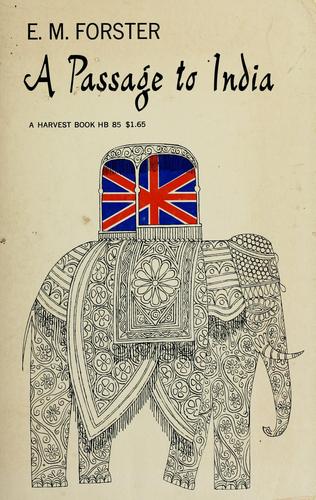 Lucinda and I occasionally discuss whether or not it is better to see the movie version of something before or after reading the book. She seems to always prefer seeing the film first. I however am the opposite. My thinking is that reading the book is more time consuming than watching a film version (except for maybe The Hobbit), so I want to keep the excitement of having the plot unfold for the reading experience. Also, seeing a film version first makes you imagine certain actors while reading the book and takes away some of the imagination one uses while reading. So, I bring all this up because a month before reading A Passage to India we watched the David Lean film version. And I really enjoyed the movie because I really knew nothing at all about the story.
Lucinda and I occasionally discuss whether or not it is better to see the movie version of something before or after reading the book. She seems to always prefer seeing the film first. I however am the opposite. My thinking is that reading the book is more time consuming than watching a film version (except for maybe The Hobbit), so I want to keep the excitement of having the plot unfold for the reading experience. Also, seeing a film version first makes you imagine certain actors while reading the book and takes away some of the imagination one uses while reading. So, I bring all this up because a month before reading A Passage to India we watched the David Lean film version. And I really enjoyed the movie because I really knew nothing at all about the story.The story is set in British ruled India where Miss Quested is visiting Ronny Heaslop to determine if she should marry him. While there Miss Quested, Ronny's mother Mrs. Moore and a British headmaster Mr. Fielding befriend an Indian doctor named Aziz. He invites them to visit some caves and *SPOILER* while alone in a cave Miss Quested mistakenly believes that Aziz tried to assault her. Then there's a big trial and everyone gets upset and stuff happens.
So having just seen the movie I couldn't help but imagine the actors while reading the book and knew exactly what was coming in the plot (and the film is fairly faithful to the book except for maybe placing a bit more emphasis on Miss Quested by showing her actually travelling to India and a pretty quick resolution to the misunderstanding between Aziz and Mr. Fielding that ends the story). All that being said I still enjoyed the book and liked the way Forster writes. The only drawbacks to me were that I wasn't familiar with all the Indian terms used throughout the book (and I'll admit laziness to not looking them up) and Forster would frequently make sweeping stereotypical statements about the differences between Indians and the British such as "Suspicion in the Oriental is a sort of malignant tumour, a mental malady, that makes him self-conscious and unfriendly suddenly; he trusts and mistrusts at the same time in a way the Westerner cannot comprehend."
I'd recommend the book and give it an A-. I'm curious though if my opinion would be any different if I hadn't seen the film first.
No comments:
Post a Comment